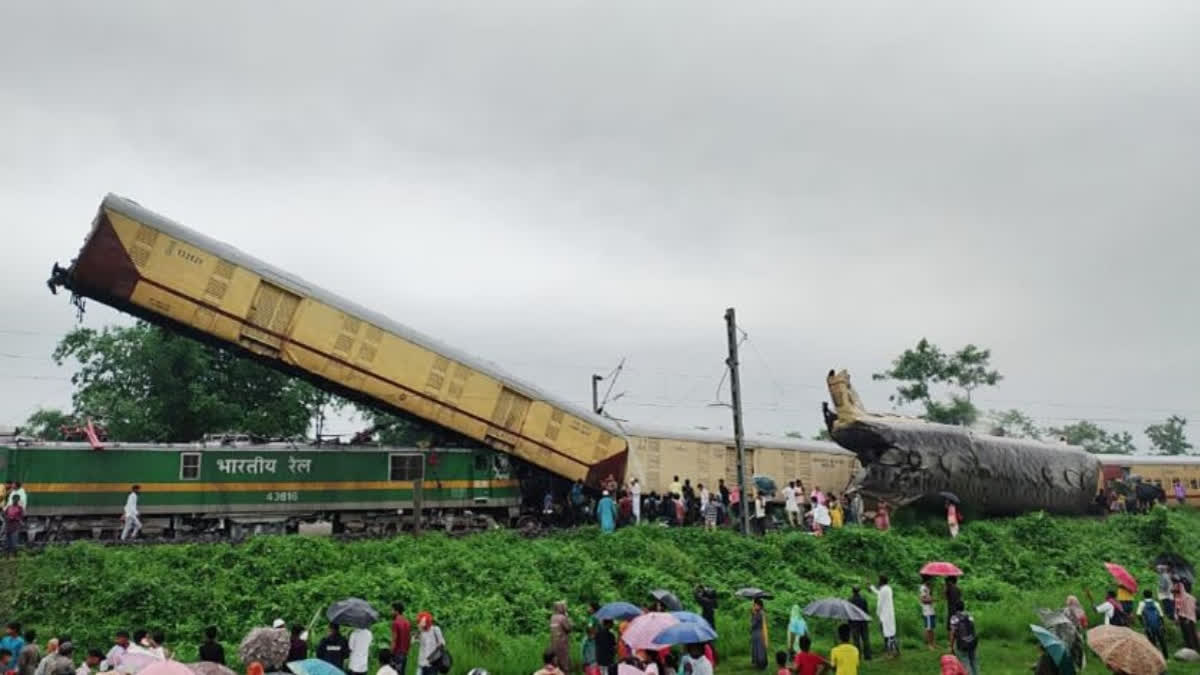Kolkata (West Bengal): The death toll in the Kanchanjunga Express-goods train collision in West Bengal's Darjeeling district has risen to 10, said officials, adding that the train has returned to Sealdah.
A senior official from the West Bengal administration confirmed that a passenger of the Kanchanjunga Express, who was injured in the mishap and was undergoing treatment at North Bengal Medical College & Hospital at Siliguri, died on Tuesday morning.
Earlier, on Monday, nine bodies were recovered, which included the loco-pilot of the goods train, guard of Kanchanjunga Express and seven passengers travelling in the two compartments affected by the collision. Railways officials said that of the 10 deceased so far, seven have been identified.
Those identified include Asish De (47), the guard of Kanchanjunga Express and Anil Kumar (46), the loco-pilot of the goods train. The remaining five deceased persons who have been identified are Subhajit Mali (32), Celeb Subba (36), Beauty Begum (41) Shankar Mohan Das (63) and Vijay Kumar Raj.
Subba is a sub-inspector with West Bengal Police. Attempts are on to track the identities of the other three deceased persons. Railway officials said one factor that limited casualties is the fact that the rear part of Kanchanjunga Express comprised the parcel coach and the guard's coach while the passenger compartments further ahead suffered less impact.
The Indian Railway has said that the movement of trains has been restored on the route/ Following the mishap, at least 37 trains were either cancelled or diverted on the route.
Meanwhile, a probe has been initiated into the tragic incident involving the Kanchenjunga Express and a goods train. The inquiry will try to find all the aspects and check the facts responsible for the incident.
Jaya Verma Sinha, Chairman and CEO,the Railway Board on Monday said, "Prima facie suggests it was a human error but will know more about it after the investigation. It seems that this is a case of signal disregard but final facts will come after the investigation."
Sanjay Kumar Pandhi, Working president of the Indian Railway Loco Runningmen Organisation, claimed, "Seven trains travelled during the period of automatic signals failure from 5:50 to 8:40 am between these two stations that day. All these trains worked on an absolute working system, Kanchanjunga Express were the eighth train on absolute system then how come this goods train was issued TA-912, without ensuring that Kanchanjunga Express has reached the next station.”
"In an absolute system - the second train cannot start from the previous station without ensuring the first train's complete arrival at the next station," claimed Pandhi.
However, the Railway officials claimed, "Railway rules mandate that when a loco pilot is given TA 912 and he has to cross a signal at Red, then he needs to approach the signal at 10 Kmph, bring his train to a stop as close as possible to the rear of a signal, wait for one minute during day time and two minutes during night time at the signal and then proceed at 10 kmph."
"Also, after passing the signal, the loco pilot should ensure that a minimum distance of 150 meters or two clear OHE span is maintained between his train and the preceding train or any obstruction on the line,” the Railway officials added.
Another Loco Pilot, on the condition of anonymity, claimed, "This incident seems a matter of procedure failure because there was an automatic signal failure and trains worked on absolute block system and in this situation, first station master has to conform next station master about reaching the train to the station or not and then next train gets clearance from the first station.”
Railways Minister Ashwini Vaishnaw told reporters at the incident site, “An inquiry has been done by the Chief Commissioner of Railway Safety. All the data log, data points and evidence are being investigated and after the probe, all the facts will be clear."
Vaishnaw, last year, in a written reply in Lok Sabha said there is a steep decline in the number of consequential train accidents from 473 in 2000-01 to 48 in 2022-23.
"The average number of consequential train accidents during the period, 2004 -14 was 171 per annum, while the average number of consequential train accidents during the period, 2014-23 declined to 71 per annum,” Vaishnaw informed in the Lok Sabha last year.
As per Railway data, an investment in safety-related projects in the 2014-24 period was 1,78,000 crore which was 2.5 times the corresponding investment of 70,273 crore in the 2004-14 period.
The average number of accidents has reduced by 60 per cent in 2014-24 (68 per year) compared with the 2004-14 period (171 per year). The Automatic Train Protection System (Kavach) was also developed and introduced during the 2014-24 period.
At this point of time, work is progressing rapidly on 3000 km routes. Design work for other routes is also progressing very fast. The mishap-hit Kanchanjunga Express arrived at Sealdah station at 3.20 AM on Tuesday carrying the passengers in the unaffected compartments.



